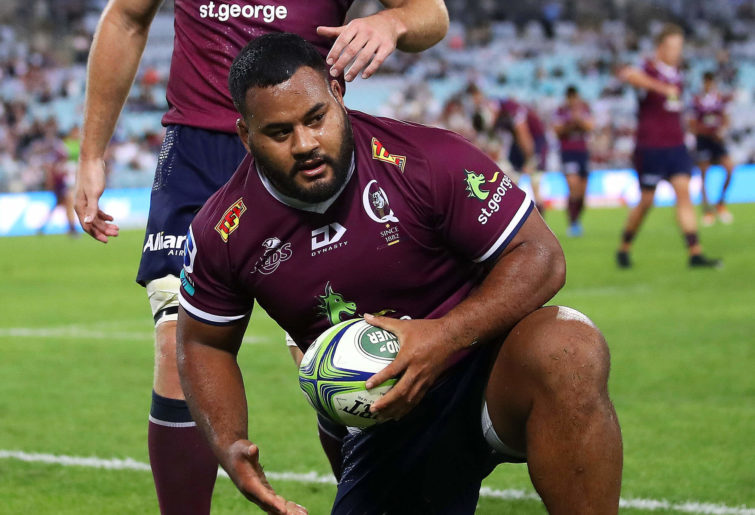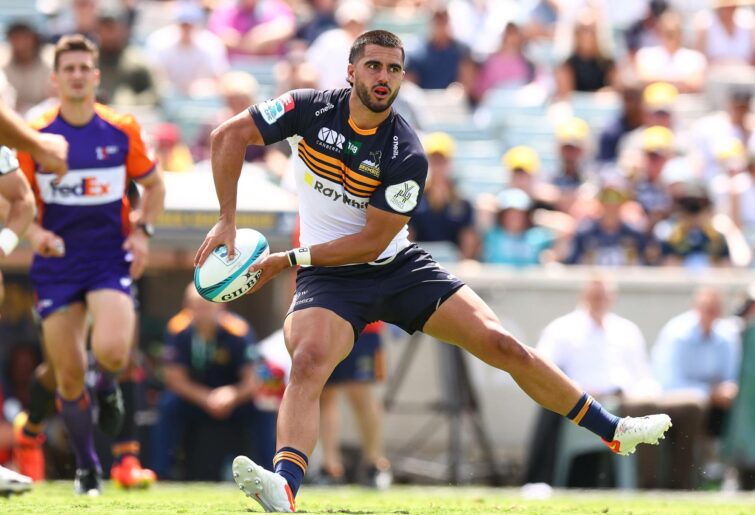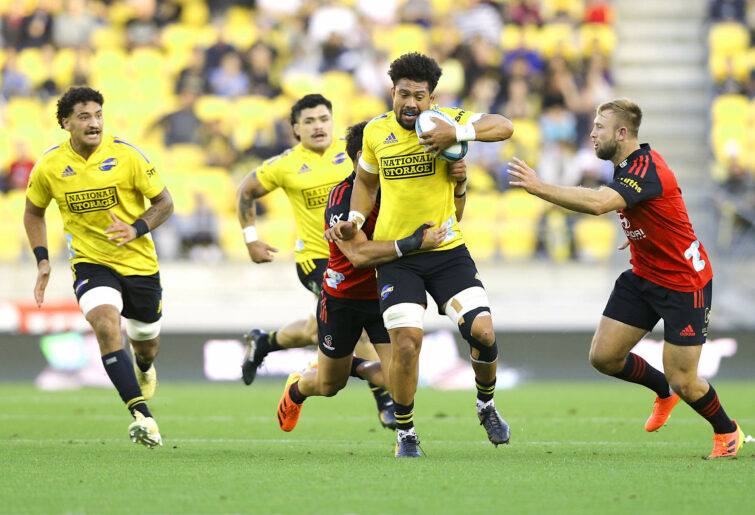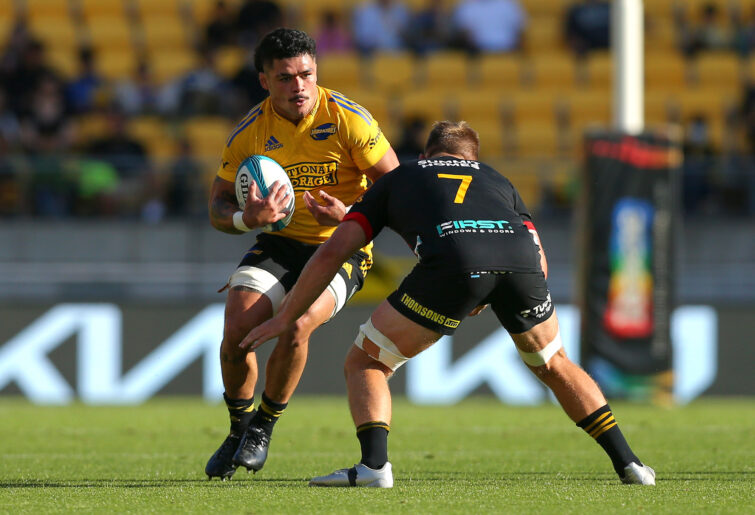
With the trans-Tasman crossover rapidly approaching, and – let’s be honest – searching for a topic to write about other than red cards and scrum resets, now seems like a good time to run the slide rule across the first eight rounds of Super Rugby, to look at which players are lighting up the competition.
I look forward to reading everyone’s suggestions below, but to kick things off, here is The Wrap’s standout top five.
Cliché or not, no Ardie Savea equals no Hurricanes. Forget arguments about whether he adds or detracts to the cohesiveness of the All Blacks’ back row, Savea is Super Rugby’s undisputed boss; the heartbeat, not only of his own team, but the whole competition.
Savea’s highlights reel so bulges with quantity and quality, anyone tasked with editing it down to a short package would simply give up and walk away. After 80 minutes of trademark leg-pumping, twisting and wriggling, Savea’s effort to find something extra to charge in for a Round 2 after-the-siren try to defeat the Blues was borderline superhuman.
Last week, Savea single-handedly bought his side back into the contest against the Chiefs with a tap-and-go try few others would have scored; and even if someone had, they wouldn’t have done so with Savea’s emphatic flourish, and lit up the crowd in the same way.
The Reds confirming their status as Australia’s best side has come about for various reasons, including a powerful scrummaging unit built around Taniela Tupou, and a solid base of young players introduced in the last 3-4 years, now with a significant number of Super Rugby matches under their belts, not just individually, but as a unit.

Taniela Tupou. (Photo by Mark Kolbe/Getty Images)
The glue in all of that is James O’Connor, who continues his latter career renaissance, playing as if nothing in the world concerns him; his calm assurance a tangible presence and influence on the players around him.
There was one virtuoso night when he put the Force to the sword in Round 3, otherwise it has been his understated game management and consistency of performance that has set him apart; not always with his preferred starting halfback Tate McDermott inside him, either.
Wallabies’ coach Dave Rennie’s endorsement this week of O’Connor as his preferred starting 10 for the upcoming England series, was a formality.
The Waratahs were earmarked for improvement this year, but the fact that this step forward – four wins and a solid mid-table position – has been built around the returning Jed Holloway, is more of a surprise.
At 29, ten years after representing Australia Under-20s, Holloway is proving to be an old-school, late-developing lock. What has impressed this season is his all-round contribution: leadership, high work-rate, power running and hard-hitting defence.
Even if Holloway never plays a Test, his elevation into Rennie’s first Wallabies squad for 2022 is wholly justified. It sends a message to all players that, no matter what might have happened in the past, consistent, commanding form in Super Rugby will be recognised and rewarded.
There’s also an element of ‘old-school’ about the way Henry Time-Stowers goes about his work. Although he seems to have been around for years, his first-class appearances in New Zealand and for the Brumbies and Force have been sporadic.
Come 2022 and Time-Stowers is made for Moana Pasifika, just as Moana Pasifika is made for him. In a competition containing many impressive big men in the 6-8 role, Time-Stowers stands out for his hard shoulders, work-rate on both sides of the ball, and judicious decision-making.
One of the anticipated benefits from the addition of Moana Pasifika and the Fijian Drua to Super Rugby is for it to provide greater depth, and deliver improved performance for the Pacific Island nations in Test rugby. In this form, Time-Stowers looks certain to add to his four Test caps for Samoa.
Very few sportspeople in history have caused the framework or laws of their sport to be re-written because of their actions. Notable examples include the ‘Tiger-proofing’ of US PGA golf courses, and the NCAA Basketball banning dunking from 1967-1976, all because of the ‘unfair advantage’ provided Kareem Abdul-Jabbar (then known as Lew Alcindor).
The Chiefs’ Pita-Gus Sowakula was afforded that distinction after his try-scoring effort in Round 1, hurdling over the top of Aaron Smith’s tackle, in Queenstown. With hurdling struck out of his repertoire, Sowakula has resorted to blistering ball running, and audacious off-loads; albeit being well contained by a committed Blues defence on Saturday.
Last season, Sowakula was a penalty magnet; too many rolls on the ground, offside, mistimed tackles and the like. But with some of the rough edges smoothed off, he’s gone up another level.
Any self-respecting ‘top five’ deserves a short list of ‘honourable mentions’; players who, while not quite in the top bracket, have left their mark on the competition.
Into this category fall Caleb Clarke, Stephen Perofeta, Vinaya Habosi, Sam Cane, Harry Wilson, Angus Blyth, Taniela Tupou, Angus Bell, Shannon Frizzell, Tom Christie, Will Jordan, Tom Wright, and, after a slow start, Cabous Eloff. No doubt, there’ll be other suggestions posted below.

(Photo by Mark Nolan/Getty Images)
The weekend’s action started in Dunedin, where both the Highlanders and Moana Pasifika enjoyed their time in possession, but struggled to hold their opponent in defence.
A 16-5 penalty count, and two yellow cards, swung possession – and the match – the Highlanders’ way, but there’s already a feeling of ‘too little, too late’ about their season.
The Rebels started against the Force in exactly the same way they started in their first match; Reece Hodge kicking dead in goal from a penalty. This time, however, it wasn’t a portent of doom, the Rebels jumping out to a handy first-half lead, and just doing enough to scrape in for a 22-21 win.
Promising inside centre Ray Nu’u had a bad night, singled out by Stan’s Lote Tiquiri as a “poor man’s Hunter Paisami”, before copping a red card for a high tackle on Brynand Stander. More on that later.
It was also a dark night for fans hoping to do more than watch multiple scrum resets, or penalties arising from the scrum. Of the 13 scrums set, six were re-set; one of them, three times. Incredibly, nine resulted in penalties or free kicks; six penalties and a free kick to the Rebels, one penalty and a free kick to the Force.
Three scrums were won by the Force on their feed, and only one by the Rebels; in the 80th minute, when they were running down the clock. Fans wondering why the Rebels aren’t providing attractive running rugby need look no further for an answer; in 79 minutes of rugby, there was not one pass from the halfback to the flyhalf, nor a single back-row play launched off the back of the scrum!
With that in mind, watch out for a stand-alone article this Thursday, on the impact scrums are having on the game, containing some fascinating insight from Dan McKellar, Nick Stiles, and referee’s boss, Mitch Chapman.
The craziness didn’t end there. With matters becoming tense in the final few minutes, and all players aware that a tiny error could swing the result, Rebels fans had to endure the match clock stopping at 77.45 and not restarting when referee Damon Murphy signalled time back on at a line-out throw.
A long sequence of play – 58 seconds worth – elapsed before the clock restarted and ran out to 80 minutes, allowing the Rebels to kick the ball out and begin celebrations.
The best that can be said is that this minute’s inattention didn’t affect the result. A harsher view might be that such amateur-hour antics have no place in what is supposed to be one of the world’s premier, professional rugby competitions.
There was another tense finish on Saturday in Wellington, with the Hurricanes turning down an opportunity for Jordie Barrett to secure a last-gasp draw – and thus head into golden-point against the Crusaders – instead opting to put the ball out in the corner.
In hindsight, the decision seems flawed, but even if the Hurricanes had entered the extra-time lottery, they may not have got another chance to win the match, and not as gilt-edged an opportunity as this was.
Hurricanes captain Savea felt hard done by, suggesting that his opposite Scott Barrett interfered in the air, then held on to the ball on the ground. If a penalty had ensued, this time, Jordie Barrett would have been kicking for the win.

(Photo by Hagen Hopkins/Getty Images)
In truth, the throw was a wee bit short and too close to the Crusaders’ side. Barrett played fairly at the ball with both hands and went to ground with a decent piece of it. Referee Brendon Pickerill told Savea there was “nothing to see”, and he was right.
An incredible match followed in Hamilton, full of sub-plots and twists and turns far more remarkable than the dour looking 25-0 score-line suggests.
This was the first time that the Chiefs have ever been held to zero in Super Rugby; a credit to an outstanding Blues defence, which for seven minutes, contained only 13 players. But it was also confirmation that no matter how hard the Chiefs tried, it just wasn’t their night.
Three times they crossed for tries, only to have them all rubbed out on review; the most crucial a Gregan/Wilson-style effort by prop Ofa Tu’ungafasi on Samisoni Taukei’aho, right on half-time.
While it was the relentless work-rate of their pack that was the bedrock, it was some vintage Beauden Barrett magic that sealed matters; two brilliant involvements setting up Tom Robinson for one of the tries of the season.
It’s worth pondering on the brutal intensity and pace of this match, and feeling more than a little apprehensive for the Australian franchises for the coming weeks. It was quite a visceral experience watching these two sides tear into each other at the breakdown as if they were a pack of hungry dogs tossed a lamb shoulder.
A potential saving grace – or is it a straw-clutch? – is that New Zealand sides often save this kind of thing for each other.

Du’Plessis Kirifi of the Hurricanes runs at Sam Cane of the Chiefs. (Photo by Hagen Hopkins/Getty Images)
By contrast, and without any crowd atmosphere of note, the Brumbies-Drua match, won 33-12 by the Brumbies, was a predictable, low-key affair; probably just the way James Slipper, celebrating his milestone 150th Super Rugby match, would have wanted it.
This match also marked the third time in two weeks where, after a player has been shown a red or yellow card for what the referee has described as “direct contact to the head”, the affected player has been allowed to play on.
In this case, Brumbies flanker Ed Kennedy played another 22 minutes before being removed for an HIA. Last week, Waratah Tane Edmed played on for seven minutes before being taken off. And in the case of Raymond Nu’u’s red card, the Force’s Brynand Stander was not removed and tested at all.
Super Rugby protocols ensure that an independent doctor is present at each match, along with the team doctors. Yet something is clearly amiss.
Rugby badly needs a coherent, joined-up understanding of what is trying to be achieved, and why. If protection of the head is sacrosanct, if players are to be shielded from debilitating conditions in later life, then the measures need to be understood and implemented consistently around the globe.
The measures also need to make sense. If players are being sent off for hitting opponents in the head, yet those players are allowed to continue playing as if nothing has happened, then who exactly is being protected?
And if those players don’t need taking from the field – evidently because they weren’t actually hit in the head – then why are their opponents being sent off and suspended?
The use of deterrent to change behaviour and lower tackle heights is an important lever. But the folly of asking referees to make definitive decisions about points of contact off fuzzy stadium screens is being exposed for the guesswork it really is.
The case for a shift to a yellow card/report system, in concert with heavy, discount-free suspensions for those players later proven guilty, is growing.
This column has been critical of the NRL for an approach to concussion that has been half-hearted and at times, disingenuous. This includes a new process introduced this year which has shifted the responsibility for removing concussed players from the field from team trainers and doctors, to an independent TV doctor.
Despite this, obviously concussed players have been allowed to stay on the field for short periods, before being removed. Culturally and system-wise, rugby league still has a long way to shift before the sport can be said to properly addressing the issue.
At least in rugby league, players are being removed for assessment much faster than in Super Rugby. It really is some achievement on SANZAAR’s part to make the NRL look like concussion leaders.